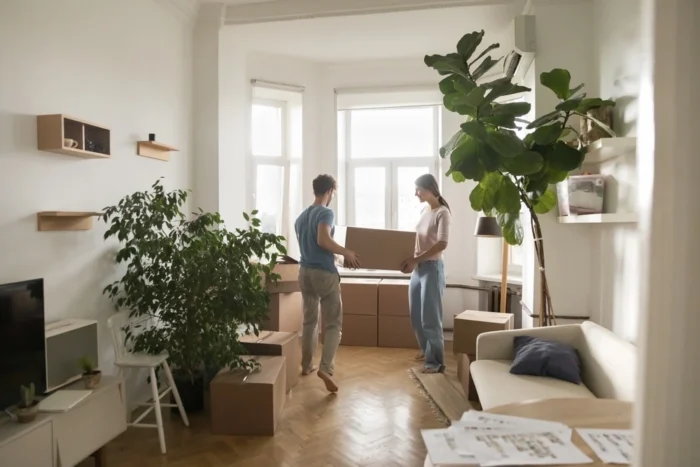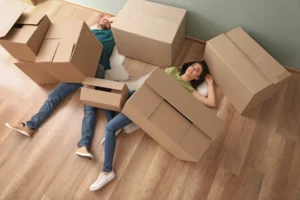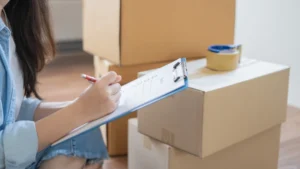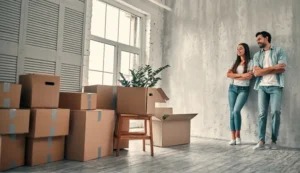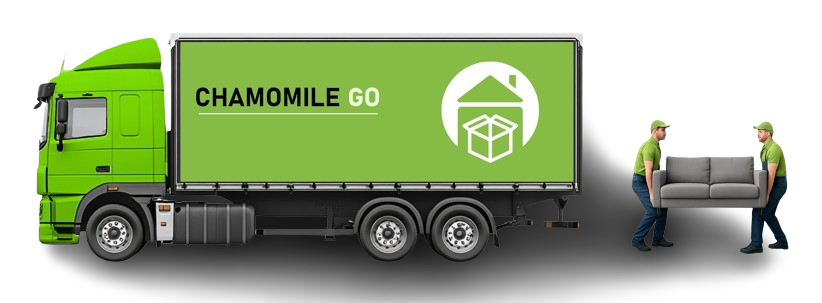How Long to Unpack After Moving is what everyone is curious about as they stare at the now barren walls and floors with the moving truck pulling away down the street. The physical relocation may be behind you, but its the unpacking that really turns a new place into a liveable, cozy home or a practical office.
Unpacking contributes to reestablishing the routine, decreasing anxiety and can help at least part of you to acclimatize to your new surroundings. To begin with, the whole thing is hard to handle for many people, but with a little bit of realism and some clear goals, unpacking gets a lot easier.
How Long to Unpack After Moving: The Average Timeline
So, on average, how long do you have to unpack after moving? Unpacking is a familiar chore for a household during moving in particular. For most homes, basic unpacking takes one to two weeks; complete organisation can take one to two months. This includes moving furniture, organizing storage spaces and hanging pictures.
The aim at first is not perfection but function. Working on these priorities first can help you feel settled sooner, even if you have a few boxes still waiting to be unpacked.
Professional services like Chamomile Go also contribute to a faster process by providing help with room setup, home organization, and smart unpacking strategies.
How Long Does It Take to Unpack an Apartment?
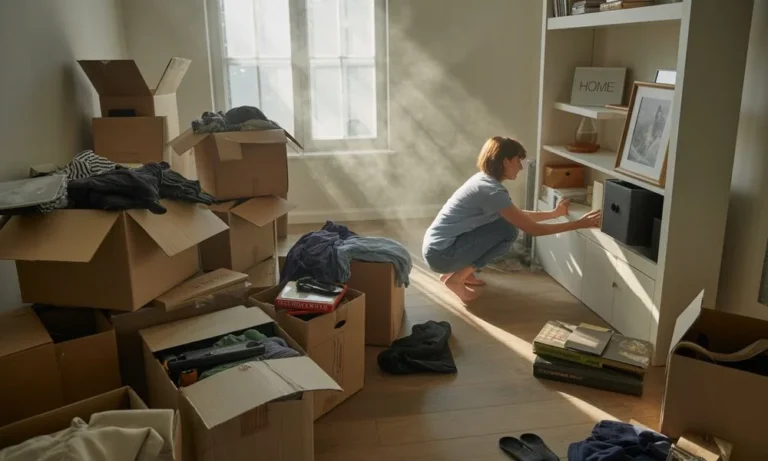
When moving to a smaller house, the big question on your mind might be, “How long does it take to unpack an apartment?” Fewer rooms and fewer belongings the reasons apartments tend to take less time to unpack..
Typical Apartment Unpacking Timeline
- Essentials unpacked: 1–3 days
- Most rooms functional: 5–7 days
- Fully organized: 2–4 weeks
Studio and one-bedroom flats can typically be made habitable within a couple of days, especially when boxes were clearly labeled and packed systematically.
How Long Does It Take to Unpack a House?
Size, number of people and way of living play a big part in how long it will take to unpack a home for larger houses.
Typical House Unpacking Timeline
- Essentials unpacked: 5–7 days
- Most rooms functional: 1–2 weeks
- Full organization and décor: 1–2 months
Bedrooms, bathrooms and kitchens are usually unpacked first to get everyday life on track. Garages, basements, storage rooms and decorative objects are commonly unpacked bit by bit.
Busy households or workaholic parents might need help or take longer.
Residential vs Commercial Unpacking Timelines
Residential Unpacking
Residential unpacking is all about living comfortably. Most homeowners want to make their home functional as soon as possible while allowing flexibility for finishing touches later.
- Basic unpacking: 5–14 days
- Full organization: up to 2 months
The service to hire for unpacking a house can ease your stress and you can use that time for other important tasks, especially if you have a large family.
Commercial and Office Unpacking
Office moves are usually on a more condensed timeline because downtime hampers productivity. Offices may empty out more quickly, but it’s a process that needs to be carefully choreographed.
- Basic unpacking: 2 to 5 days
- Full setup and organization: 2 to 4 weeks
Furniture arrangement, IT installation and workspace management all play a role in how quickly an office is ready to work in.
You may read Benefits of Hiring a Moving Company?
What Affects How Long It Should Take to Unpack After Moving?
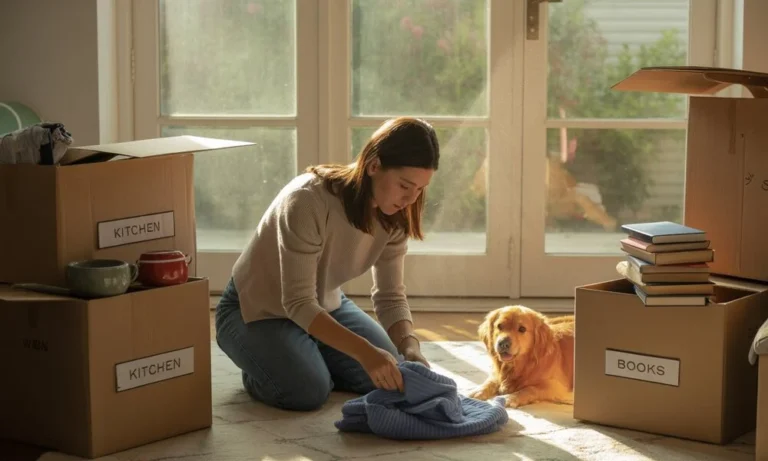
There are a few things that influence the length of time for unpacking after moving, such as;
1. Size of the Space
A small apartment is quicker to unpack than a big house or office.
2. Number of Belongings
More boxes means more time sorting and deciding what to keep and what to throw.
3. Labeling and Packing Quality
Well-labeled boxes save you hours eg searching and frustration.
4. Available Help
Help It just takes longer to unpack alone than it does to unpack with family, friends, or professionals.
5. Daily Schedule
The hours you work, your kids, how much energy you’ve got — all of those contribute to how quickly you can unpack.
Where Should You Start Unpacking First?
It is true, unpacking out in the dirt helps to speed settling in and it helps prevent burn out.
Unpack Essentials First
- Toiletries
- Medications
- Chargers
- Daily clothing
Next Priority Rooms
- The Bedrooms (for Sleeping Properly)
- Bathrooms
- Kitchen
Once you get these rooms usable, the rest of the unpacking seems a lot less daunting.
Tips to Unpack Faster After Moving
To shorten the duration of unpack after moving, use the following strategies:
- Put down roots in one room at a time
- Make small daily goals
- Break down empty boxes instantly
- Dont expect to get it all totally organized the perfect way on day one.
- Ask for help or hire the pros.
Professional unpacking services can significantly speed up and ease the process while alleviating physical strain and decision fatigue.
Is Professional Unpacking Worth It?
A lot of people think so. The following are the benefits of professional unpacking services:
- Make Your Home or Office Workable Sooner
- Alleviate stress and fatigue
- Be Efficiently Organized From the Get-Go
The service to hire for unpacking a house can ease your stress and you can use that time for other important tasks, especially if you have a large family.
Final Thoughts
Unpacking usually takes a week for essentials and up to two months for full organization, depending on your space and support. If you’re looking for a reliable Sherman Oaks moving company to speed up the process, Chamomile Go offers the professional expertise you need. Our team handles everything from residential settling to office transitions with precision and care. Don’t let the boxes pile up; let us manage the heavy lifting so you can enjoy your new home immediately. Contact Chamomile Go today for a seamless move!
FAQs
How long does it normally take to unpack after moving?
Most people settle their essentials within one to two weeks, though full organization often takes a few months. Your speed depends on your home’s size, your work schedule, and your overall energy levels.
How to efficiently unpack after moving?
Focus on one room at a time, starting with the kitchen and bathrooms to make the house functional immediately. Flatten and remove boxes as you empty them to keep your new space clear and reduce visual stress.
Do you unpack as soon as you get home?
You should prioritize unpacking the essentials—like your bed, linens, and toiletries—as soon as you arrive. This ensures you have a place to sleep and wash up after a long first day of moving.
Can you unpack a house in a day?
While a professional crew or a large group of friends can do it, it is nearly impossible for an individual to do so effectively. Moving too fast often leads to “shoving” items into cabinets rather than finding them a permanent home.
What is the 10-10-10 rule for decluttering?
This rule involves finding 10 items to throw away, 10 to donate, and 10 to return to their correct locations. It’s a simple, high-impact way to clear out 30 items quickly without the mental exhaustion of a deep clean.
